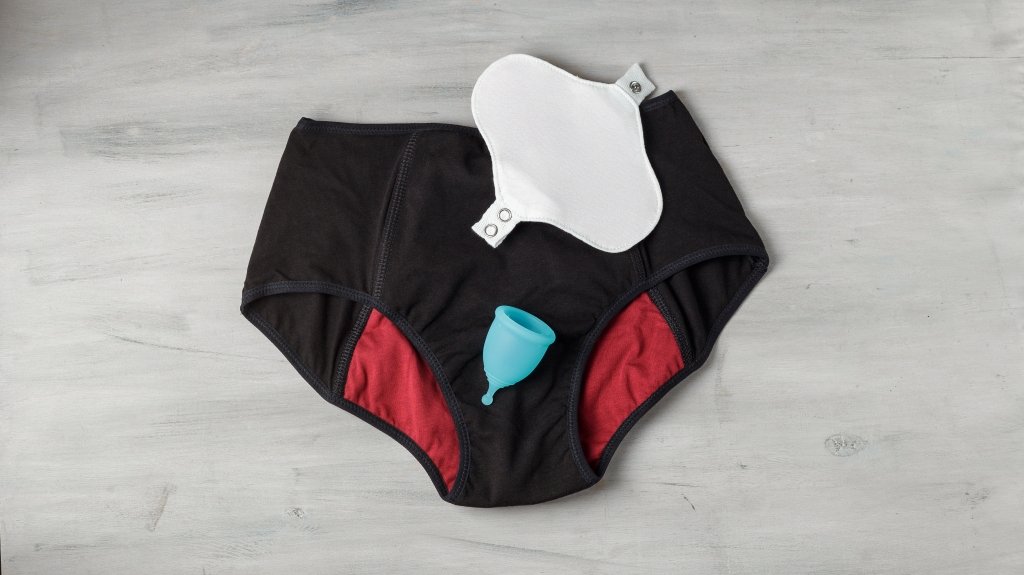‘Code Red’ : Sustainability and Education in the Feminitt Safe Cycle Campaign
Code Red. Roses, Red Car, Shark Week, Flow, Niagara Falls… There are several expressions that menstruating persons, people use to refer to the menstruation cycle. To periods. The miseducation, poverty with regards to proper and sustainable access to menstruation resources, both material and immaterial is a running thread throughout societies across the world. The aim of the Safe Cycle Campaign is to end period poverty for menstruating persons’, and to end the miseducation of menstruation for people.
[Reusable eco-friendly feminine hygiene period products - menstrual cup and black menstruation pants and organic cotton cloth everyday pad. Top view on grey background.]
Safety, in Safe Cycle, represents so many parts of menstruating persons’ health and wellbeing. Security of access to hygienic products and facilities, safety in awareness and knowledge of a person’s menstruation cycle, security in navigating a person’s cycle. Poverty too, in the Safe Cycle Campaign, refers to elements both material and immaterial in the safety of a person’s cycle. Immaterial poverty relates to the education – or lack thereof – with regards to menstruation, the menstruation cycle, and this both to menstruating persons’ and non-menstruating persons. Evidently, the material dimension of period poverty is evident: the financial budget allocated to the regular – or not! – necessity of hygienic products. The cyclical necessity of these – whatever products are used – is hindered by the prices of such products. Pursuing a sustainable and healthy cycle is thus rendered substantially more difficult due to the respective financial capacities of each person.
For instance, take a menstruating person who functions on a limited budget, and allocates a small portion of that budget to their needs for their menstruation cycle, scheduling that budget month to month. Consider that they might wish to pursue more environmentally sustainable menstruation options, like reusable/washable pads or menstrual cups. First, they might lack the budget to accommodate for that expense, and second, they might lack the resources to be able to wash, re-use and maintain these products. And this is only one example, the choice of every menstruating persons’ use of products is conditional to so many variables, external to their body – socio-economic conditions – and internal to their body – the flow, timing of their cycle, contraception...etc. Both concepts of security and poverty are key factors in the aforementioned example.
The menstruation cycle is an integral part of human biological function, and affects so many other parts of human biology, physiology and psychology. Proper education of what the cycle entails, how it affects a person’s makeup, and how it is managed, respective to each person, is vital. Period poverty thus refers to both material and immaterial realities of the menstruation cycle. Ending period poverty, ensuring safety implies facing these material and immaterial realities with a collective lens.
The key issues as outlined above, are not issues that can be surmounted by the individual. The collective plays a crucial part in taking steps to find long-term solutions to these issues. Feminitt Caribbean’s Safe Cycle Campaign wishes to do just that: inform, discuss and promote solutions for and with the collective – and by collective I mean people, organisations, state institutions…etc. To address the safety of a person’s menstruation cycle: the implementation of wash and hygienic facilities for proper access to hygienic products and maintenance of one’s hygiene throughout their cycle. This addresses issues of safety and issues of material period poverty. To address period poverty: the use of health facilities and experts to establish a mandatory education program for menstruating and non-menstruating persons. This addresses issues of immaterial period poverty. These are steps that need to be taken by the collective with an evolving and enduring lens.
Sustainability in the Safe Cycle Campaign regroups key concepts of security and poverty. Beyond the implied dimension of environmental welfare, sustainability here demands the longevity of security and education with regards to the welfare of menstruating and non-menstruating persons. Longevity in making sure that any and all steps taken to end period poverty and counter miseducation now are forward-looking and long-lasting steps socially, economically, and environmentally. This is the crux of the Feminitt Caribbean Safe Cycle Campaign, and can be achieved through the promotion of proper education, conversation and relation within the collective.
References
Feminitt Caribbean. 2021. Safe Cycle Report: Ensuring a Safe Menstrual Cycle and Menstrual Equity . Trinidad and Tobago: Feminitt Caribbean.
Nyala Thompson Grunwald is a Franco-Trinbagonian panist and artivist with a Bachelor of Arts in Music- History and is currently based in Ireland. Nyala's research thus far focuses on intersectional discussions of race and music through gender and culture in Afrodiaspora.

